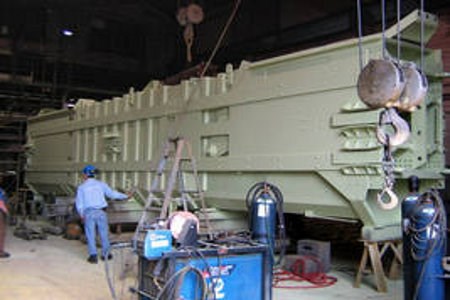For Peter Birnie, 'Buy American' protectionism represents a serious threat to his business and employees.
The times haven't been kind to Birnie lately. The New Liskeard-based Wabi Iron and Steel owner recently had to permanently lay off 17 employees of his 150-person workforce,and made six others take early retirement. In the coming days, he says he's going to have to lay off 40 more.
The reason for the layoffs, he said, is to due to the slumping economy, but he fears protectionism could lead to more terminations. That's why he's trying to make sure protectionism doesn't further damage his fabrication and machine shop.
“I have to make every effort to make sure that I get my people back to work as quickly as possible,” he said.
Birnie, who is also vice president of Canadian Foundry Association, is in Washington D.C. this week to protest 'Buy America' protectionism going on there. Joining him in support was one of his longest serving American customers, an undisclosed large equipment manufacturer.
American protectionism first made headlines earlier this month when a Californian military base removed underground pipes because they were labeled, “Made in Canada.”
The issue mostly lies with American municipalities refusing to allow Canadian companies to bid or provide goods and services for U.S. public infrastructure projects.
“We have a free trade agreement between the two national governments,” said Birnie. “The free trade agreement states clearly that we won't have barriers to access to U.S. at the national level. Our position is if there's one dime of federal money, either in Canada or the United States that's in a project, then that's covered under the free trade agreement.”
On his trip, Birnie met with Canada's U.S. ambassador Michael Wilson and representatives for the lobby group of the Canadian Manufacturers and Exporters in America.
The meeting with Wilson was productive, said Birnie.
“The ambassador indicated strongly that he understood what our customer had to say and that he would make every effort to work on behalf of Wabi Iron and Steel and other manufacturers that are exporting to the U.S.,” he said.
Part of his personal campaign is to raise awareness of the harm to manufacturers that protectionism causes and he is petitioning the Canadian government to start a larger national lobbying effort. Birnie is trying to attract attention in North American media as well.
After his trip is over, Birnie plans to keep up his message with the Federation of Canadian Municipalities at its annual meeting in June to try and urge all Canadian cities and towns to stop buying products from countries who shut out Canadian manufacturers.
“If countries of origin aren't going to play on a level playing field, the municipalities and possibly the provinces of Canada have no choice but to put the free trade agreement that's on a basis that's consistent with the way the Americans are interpreting it,” said Birnie.




